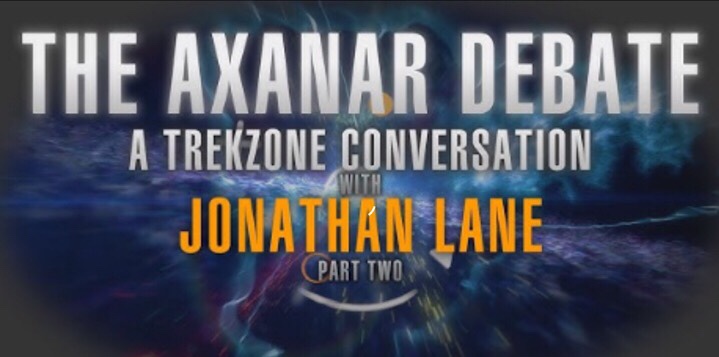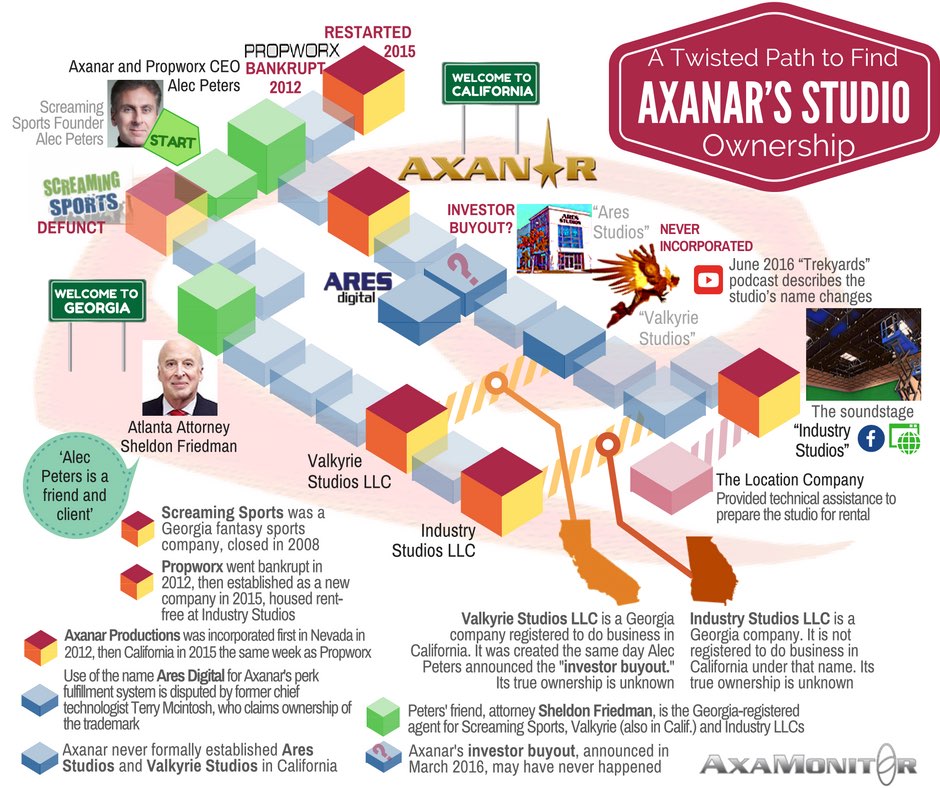 SECOND MATCH Fan Film Factor’s Jonathan Lane dominates again in the second podcast debate with Trekzone’s Matt Miller, focusing this time on the escalating rift between Axanar supporters and critics. Image/Trekzone
SECOND MATCH Fan Film Factor’s Jonathan Lane dominates again in the second podcast debate with Trekzone’s Matt Miller, focusing this time on the escalating rift between Axanar supporters and critics. Image/Trekzone
Analysis
DECEMBER 18, 2018
Debate Focuses on AxaMonitor as Cause for Trek Fans' Rift
Axanar Proponent Jonathan Lane Defends Axanar Lawsuit, Blames AxaMonitor
In the second installment of what was billed as the Axanar debate, fan film blogger Jonathan again outmatched Trekzone’s Matt Miller in discussing the copyright lawsuit and whether AxaMonitor was responsible for fostering hatred toward Axanar.
The one-hour, fifteen-minute podcast was released December 17, 2018, produced by Miller as one of his continuing series of “Trekzone Conversations,” and posted both on his website and on Lane’s Fan Film Factor blog, which often serves as the news organ for Axanar and its producer, Alec Peters.
The Righteous Mind
The debate offered some new nuggets of information about Axanar’s side of the lawsuit but focused most of Lane’s analysis on what he called “the righteous mind” of Axanar critics who use the information published by AxaMonitor to conform reality to their worldview. Lane’s reference was to the 2012 book by psychologist Jonathan Haidt.
Miller and Lane had previously agreed on the questions they would field during their debates, giving each the chance to prepare. Lane came ready to press his points, armed with facts to support his arguments.
LISTEN to the second part of Trekzone’s Matt Miller’s Axanar debate with proponent Jonathan Lane.
Miller offered the occasional challenge but Lane brushed these aside as he went on to take the most airtime, linking CBS and Paramount's lawsuit to what has become an often vitriolic division between Star Trek fans who support Axanar and those who criticize the production.
Eight-Year-Old Child
Lane drew an analogy between fan films and his 8-year-old son, with CBS and Paramount as “mommy and daddy.” Axanar supporters want the child — Axanar, in this instance — to be able to “push the envelope” of what fan films were allowed to do, Lane said.
However, “mommy and daddy did not want that fan film to be made,” Lane added. Axanar “detractors” believe “mommy and daddy have the ultimate power. That’s where the division between detractors and supporters started.”
Miller agreed with that characterization.
Escalating Conflict
Miller went on to ask why the arguments for and against Axanar have devolved into personal attacks.
In response, Lane played a prepared excerpt from a recent Alpha Waves podcast interview by host and Axanar critic Michael Hinman in which AxaMonitor editor Carlos Pedraza admitted his coverage had played “some role in” the escalation of tensions surrounding Axanar.
Lane decried “detractors’” bad deeds as being enabled by Pedraza because malefactors could always “point to AxaMonitor as classy and real” in its critical view of Axanar.
'Fox News of Axanar'
Lane said that justified his belief “the AxaMonitor blog is one of the main causes” of escalating conflict surrounding Axanar.
“It is a site that rushes to produce negative blogs about Axanar,” often publishing unconfirmed facts, Lane said. “It’s the Fox News of Axanar.”
He pointed to a 2017 article in which AxaMonitor published the incorrect address of the Atlanta-area warehouse to which Axanar was forced to move after losing its never-finished California production facility after sinking nearly three-quarters of a million dollars of donors’ money without ever shooting any of Axanar inside.
AxaMonitor‘s initial report was indeed incorrect because it was based on sources controlled by Peters who deliberately supplied false information.
See also: Editorial: Fool Me Once, Shame on You
Despite dismissing the disinformation effort by Peters as a mere prank, Lane used the article (in which AxaMonitor issued a correction immediately) to justify his characterization of AxaMonitor:
“Most of the time Carlos does not lie,” Lane said. “It’s half-truths — his choice of phrasing, his choice of adjectives, his choice of headlines is skewed.”
'Twisted Path'
Lane also pointed to a 2016 AxaMonitor investigation, “Twisted Path to Discover Axanar's Studio Ownership,” which questioned the lack of transparency, contradictions and inaccuracies surrounding the business Peters tried to launch with his donor-paid studio retrofit.
The introductory paragraph for that investigation read: “With the formal opening of the for-profit studio Alec Peters built using money supporters donated to produce Axanar, AxaMonitor‘s investigation into the companies behind the studio revealed a complete lack of transparency about who stands to financially benefit from the facility.”

DISPUTED INVESTIGATION Jonathan Lane challenged the objectivity of AxaMonitor's 2016 inquiry into Alec Peters’ Georgia business concerns, his Atlanta attorney and his California companies as mapped out in this infographic. Click image to view full size, or view 480K PDF with added hyperlinks. Valkyrie graphic/Shuri Dreamscape/Flickr
'For Profit' Studio
“That’s not necessarily not true,” Lane claimed, “but not the whole story.” He criticized the description of the studio as “for profit,” and claimed that “donors wanted to help build the studio,” reminding Miller he had previously conceded donors had been duly informed about the studio funding during the Axanar Kickstarter campaign.
While he spent time attempting to frame the use of the term “for profit” as AxaMonitor’s attempt to skew readers’ minds, Lane neglected the fact — presented in the AxaMonitor article — Peters himself in a March 2016 blog post had characterized the studio in that manner:
A small group of backers and fans have developed a plan to set up a separate company to take over the management the sound stage, pay the rent and reimburse Axanar Productions for the cost of the build-out. That company will assume the $250,000 liability for the remainder of the lease. To do that, the new company will need to be a for-profit entity and raise investment dollars for capital.1)
Donor Support of the Studio
Lane’s only other specific dispute with the article was how it appeared to presume donors hadn’t known their money was being diverted from Axanar‘s actual production to building Peters’ studio, an issue Lane had successfully debunked in the first podcast.
However, that inaccuracy was conceded by Miller only with regard to his own knowledge of the Kickstarter campaign. AxaMonitor has never asserted the Kickstarter didn’t include a reference to some funds being devoted to outfitting a studio in which to shoot Axanar.
AxaMonitor made that clear in its March 2016 analysis of Axanar’s Annual Report, in which AxaMonitor cited Peters own words regarding the 2015 “Infrastructure Kickstarter.” Peters said:
[The] Axanar Kickstarter was launched with some very specific goals in mind, namely, building the infrastructure that would allow us to make Axanar and other Star Trek properties.2) [emphasis added]
However, Peters’ own annual report disputes Lane’s contention that donors supported the use of the funding from that Kickstarter for the studio refit; Peters acknowledged the prevailing public perception of the Axanar Kickstarter was to “incorrectly assume that the money was to go to production costs.”3) [emphasis added]
Moreover, people who donated to the Kickstarter campaign were explicitly told only a small portion of the proceeds were to go to the studio refit, a mere $50,000, along with the budgeted $125,000 for the first year’s rent, for a total $175,000.4)
Those two items actually ended up costing nearly three-quarters of a million dollars, according to Peters’ 2017 financial report.5)
Furthermore, the Kickstarter campaign told potential donors an estimated $325,000-$425,000 of the proceeds were earmarked for Axanar production costs6), with Axanar having spent all its donor funding by May 2016.
Ultimately, all of the Kickstarter proceeds were swallowed up by the ballooning costs for keeping the studio; none went toward production costs as promised.7)
Lane also failed to dispute any of the facts presented in the investigation, each of which was attributed to a verifiable source, including court documents, and some of which were documented statements from Peters himself and Axanar’s official spokesman, Mike Bawden.
Lane instead broad-brushed the entire article based on these two critiques, summing up by saying the investigation “is not presenting the whole story.”
Lane also neatly avoided the fact that AxaMonitor in fact tried to get the “whole story” by seeking comment from Peters’ attorney cited in the article, Sheldon Friedman, and his spokesman Bawden. Both refused to answer any questions about issues raised by the investigation.
Nothing Positive
Lane also pointed to Pedraza’s attendance at Axacon followed by the lack of an AxaMonitor article about it being a positive experience for the 30 people who attended.
While that article was delayed by Pedraza’s real life job, he had not been silent about Axacon, having devoted part of his November 18 Alpha Waves interview to his reaction about the event, as well as an appearance on the Super Geeks podcast.
The Lawsuit
The first part of the Trekzone podcast was devoted to Lane’s chronological retelling of the CBS/Paramount copyright infringement lawsuit against Peters and Axanar Productions.
He asked Miller to imagine himself in Peters’ place on December 30, 2015, when he learned he was being sued potentially for $150 million. Though CBS/Paramount never specified the amount of damages they sought, the $150 million figure was Lane’s own extrapolation based on 1,000 copyright violations multiplied by the statutory damages per infringement of $150,000.
After reaching out to Winston & Strawn, the law firm that went on to represent Axanar pro bono, Lane said Peters submitted a settlement offer, that in exchange for guidance spelling out what he could and could not do, he would make Axanar and give it to CBS for free, ostensibly imagining it could earn revenue for the studio.
Settlement Offers
That offer was rejected by CBS/Paramount with no counteroffer. Peters had only two options at that point, Lane said:
- He had only 30 days to reply (not true: at the point Lane described, under federal rules, defendants have 21 days to respond to a suit; this was eventually extended but Peters didn’t know that at the time); or
- He could simply fail to reply, which would guarantee a summary judgment against him (not true: the plaintiffs would have had to ask the judge for a default judgment against Axanar; such a ruling would not have been automatic).
'Balls to the Wall'
“The only option was to go through with it,” Lane said. “Alec had no choice. He had to go balls-to-the-wall on this.”
Miller, himself a fan film producer, disputed Lane’s notion, saying if had been told by Star Trek’s owners to stop, he would simply stop.
Meanwhile, CBS/Paramount’s first settlement offer didn’t come until June 2016: “Shut down everything Axanar. … Axanar could not happen. Period,” Lane said. “‘And we won’t sue you,’” he described them offering.
“Alec was furious,” Lane told Miller. “They didn’t want to negotiate.”
Lane also disputed a claim by Pedraza that CBS had made an offer to Axanar in April 2016, saying the plaintiffs’ first offer didn’t come until June. However, while AxaMonitor had received information in April about a settlement meeting, and in May about terms CBS was seeking, similar to what was ultimately settled, it did not report that at the time; Pedraza was unable to get a second source to corroborate.
A 'Game-Changer'
But for Axanar, getting Winston to represent him “was a game-changer,” Lane said, enabling Peters to press a case he and his lawyers believed held hope: That Axanar could legally be produced under the Fair Use provisions of U.S. copyright law. Peters refused the studios’ offer and continued to press for a settlement that would allow some version of Axanar to be made, Lane said.
However, Axanar lost its fair use defense in early January 2017, according to a ruling by the judge in the copyright case, a finding Lane said offered Axanar chances for an appeal.
A Win
But just days before the scheduled trial, Peters essentially got what he wanted: permission to make Axanar and guidelines to which he had to adhere. “Alec got the win he wanted,” Lane said.
Foremost among them, however, was his concession that the film would no longer be feature-length, as had been promised to donors. Instead, they would get two 15-minute short films, which would have to be produced (Peters later estimate a cost of almost $200,000) with no further crowdfunding.
Next Installment
Part 3 of the debate is due on December 19. 
COMMENTS
Discuss this article in AxaMonitor's Facebook group.
Keywords

